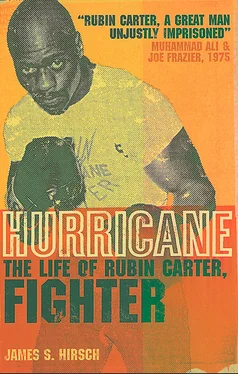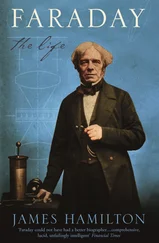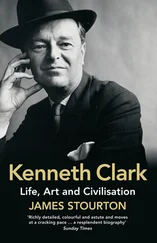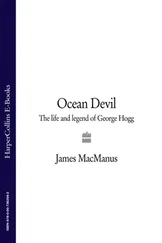Young Rubin welcomed any physical challenge—the more dangerous, the better. He swam in the swift waters of the Passaic River, jumped off half-built structures at construction sites, ran down mountains, and rode surly mules on his grandfather’s farm. On a swing set in the Newman playground, he swung so high that he flipped completely around in full circles. On one occasion, he and a friend, Ernest Hutchinson, were cutting through a backyard when a big bulldog ran at them. “I was going nuts, but Rubin told me to stand behind him,” Hutchinson recalled. “All of the sudden, the dog leaps and— bam! —Rubin hits him right in the chest. The dog rolled over and couldn’t catch his breath. I’ll never forget that. We were ten years old.”
Rubin continued to rebel against his father’s rules. Even on a simple walk to P.S. 6 on Carroll and Hamilton Streets in Paterson, he had to make his own way. Lloyd Carter stood on the porch of their Twelfth Avenue home and made sure all his children took the safest, most direct route. When the brood was out of his sight, Rubin ducked into an alley, hopped a fence, and took a different, longer way. He was literally incapable of following the crowd.
But misdeeds landed him in more serious trouble—with both his father and ultimately the police. Rubin stole vegetables from a garden owned by one of his father’s co-workers, ransacked parking meters, and led a neighborhood gang called the Apaches. When he was nine, the Apaches crashed a downtown marketplace, stealing shirts and sweaters from open racks, then fleeing to the hills. Rubin gave his stolen goods to his siblings. When his father saw the new clothes, price tags still attached, and was told that Rubin was responsible, he beat his son with a leather strap, then called the police. The boy was taken to headquarters—his first encounter with the police. He would always resent that his father had initiated what would become a lifelong battle with law enforcement officials. The following day, the Child Guidance Bureau placed him on two years’ probation for petty larceny.
For all the confrontations between father and son, Rubin noticed that he liked to do many of the same things as his father. While his two brothers and four sisters often begged off, Rubin hunted with his father and accompanied him on trips to the family farm in Monroeville, New Jersey. His mother told him that his father was hard on him because Lloyd himself had also been a rebel in his younger days. Now, the father saw himself in his youngest son.
That did not become clear to Rubin until he was in his twenties, when he and his father went to a bar in Paterson where the city’s best pool shooters played. As they walked in, the elder Carter quipped, “You can’t shoot pool.”
A challenge had been issued. Rubin considered himself an expert player, and he had never seen his father with a cue stick. Indeed, Lloyd hadn’t been on a table in twenty years. They played, betting a dollar a game, and Lloyd cleaned out his son’s wallet.
Rubin, shocked, simply watched. “Where did you learn to play?” he asked.
“How do you think I supported our family during the Depression?” his father replied. “I had to hustle.”
Unknown to his children, Lloyd Carter had been a pool shark, and his disclosure seemed to clear the air between him and Rubin. “Why do you think I always beat on you?” Lloyd said later that night. “You wouldn’t believe how many times your mother said, ‘Stop beating that boy, stop beating that boy.’ But I saw me in you.” Lloyd Carter had also rebelled against authority, and he knew that was a dangerous trait for a black man in America. “I was trying to get that out of you,” he told his son, “before it got hardened inside.”
It was too late, however. Rubin’s defiant core had already stiffened and solidified.
For all the turmoil in his youth, Carter actually fulfilled one of his boyhood dreams: he wanted to join the Army and become a paratrooper. In World War II the Airborne had pioneered the use of paratroopers in battle. It was not, however, the division’s legendary assaults behind enemy lines that captivated Carter. Nor was it the Airborne’s famed esprit de corps or its reputation for having the most daring men in the armed forces. Carter liked the uniforms. Even as a boy he had a keen eye for sharp clothing, and he admired the young men from Paterson who returned home wearing their snappy Airborne outfits: the regimental ropes, the jauntily creased cap, the sterling silver parachutist wings on the chest, the pant legs buoyantly fluffed out over spit-shined boots.
By the time Carter enlisted, however, the uniform was not his incentive. At seventeen, Carter escaped from Jamesburg State Home for Boys, where he had been serving a sentence for cutting a man with a bottle and stealing his watch. On the night of July 1, 1954, Carter and two confederates fled by breaking a window. They ran through dense woods, along dusty roads, and on hard pavement, evading farm dogs, briar patches, and highway patrol cars. Carter’s destination was Paterson, more than forty miles away. When he reached home, the soles on his shoes had worn off. His father retrofitted a fruit truck he owned with blankets, and Rubin hunkered down in the pulpy hideaway while detectives vainly searched the house for him. Soon Carter was shipped off to relatives in Philadelphia. He decided, ironically, that the best way for him to hide from the New Jersey law enforcement authorities was by joining the federal government—the armed forces. With his birth certificate in hand, he told a recruiting officer that he was born in New Jersey but had lived his whole life in Philly. No one ever checked, and Rubin Carter, teenage fugitive, was sent to Fort Jackson, South Carolina, to learn to fight for his country.
Carter was no patriot, but soldiering allowed him to do what he did best: wield raw physical power. The Army, in some ways, was similar to Jamesburg, the youth reformatory. Carter lived in close quarters with a group of young men, and he was told what to do and when to do it. Individual opinions were forbidden; and just as a reformatory was supposed to correct a wayward youth, the Army was supposed to turn a civilian into a soldier. Carter spent eight grinding weeks in basic training, followed by eight more weeks to join the Airborne. He was then sent to Jump School in Fort Campbell, Kentucky. Recruits were known as “legs,” because graduates received their paratrooper boots. Each class began with about 500 would-be troopers; as few as 150 would graduate. The school’s relentless physical demands thinned the ranks, as recruits were eliminated by the early morning five-mile runs, the pushups on demand, the pullups, the situps, the expectation to run everywhere while on the base, even to the latrine.
Most difficult of all, however, trainees had to learn to leap twelve hundred feet from a C-119 Flying Boxcar. To prepare, they hung from the “nutcracker,” a leather harness suspended ten or fifteen feet aboveground. They lay on their backs strapped to an open parachute while huge fans blew them through piles of sharp gravel until they were able to deflate the chute and gain their footing. There was also the “rock pit.” Soldiers stood on an eight-foot platform, jumped into the air, and did a parachute-landing fall onto the jagged bed of rocks. They then got up and did it over and over again until ordered to stop. To quit was tempting, but the Army sergeants and corporals who ran the Jump School gave those who faltered a final dose of humiliation. They were forced to walk around the base with a sign on their shirt that read: “I am a quitter.”
To Carter, Jump School was “three torturous weeks of twenty-four-hour days of corrosive annoyance.” But when he executed his first jump, he excitedly wrote home about it, flush with pride, and later described the sensation.
Читать дальше












